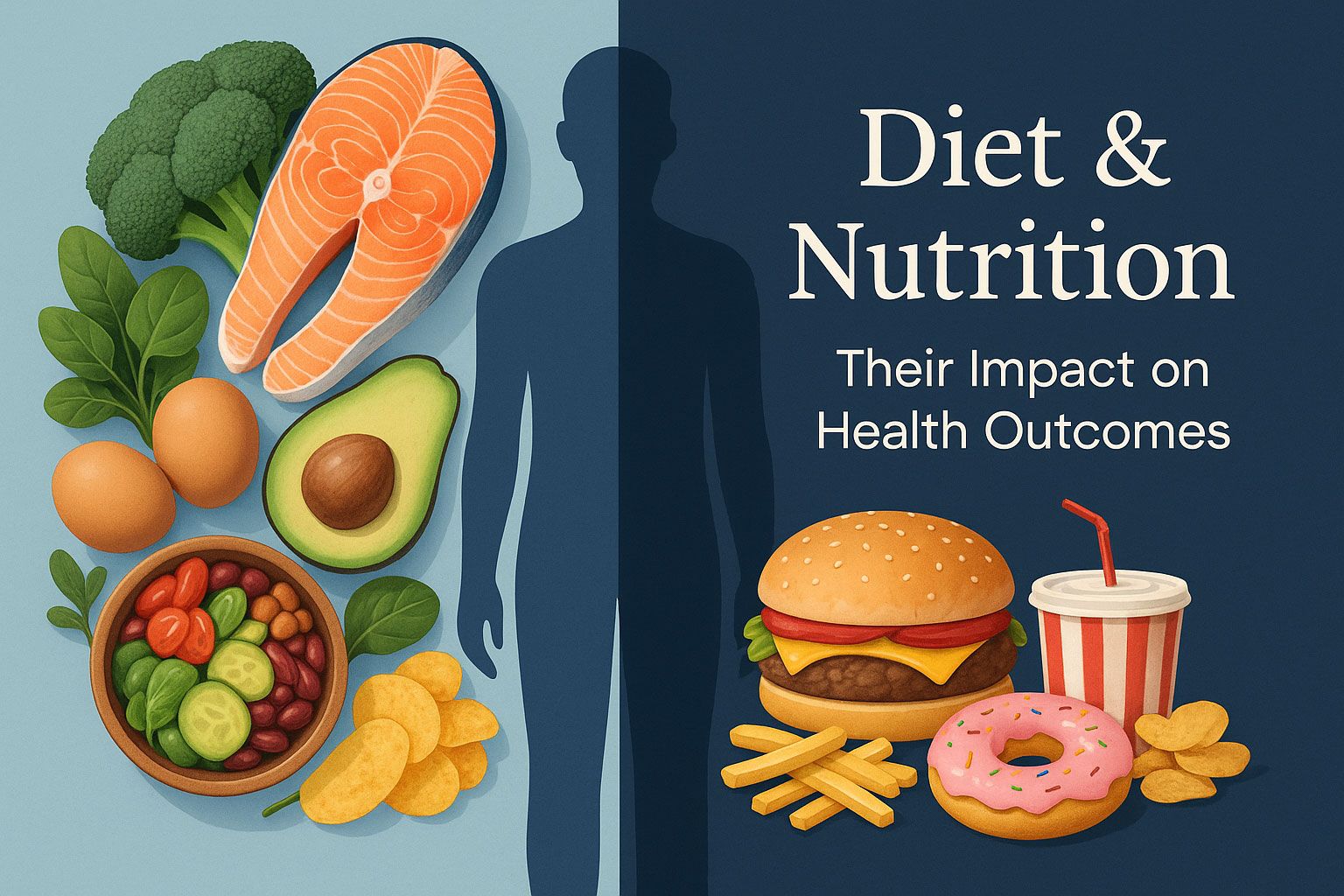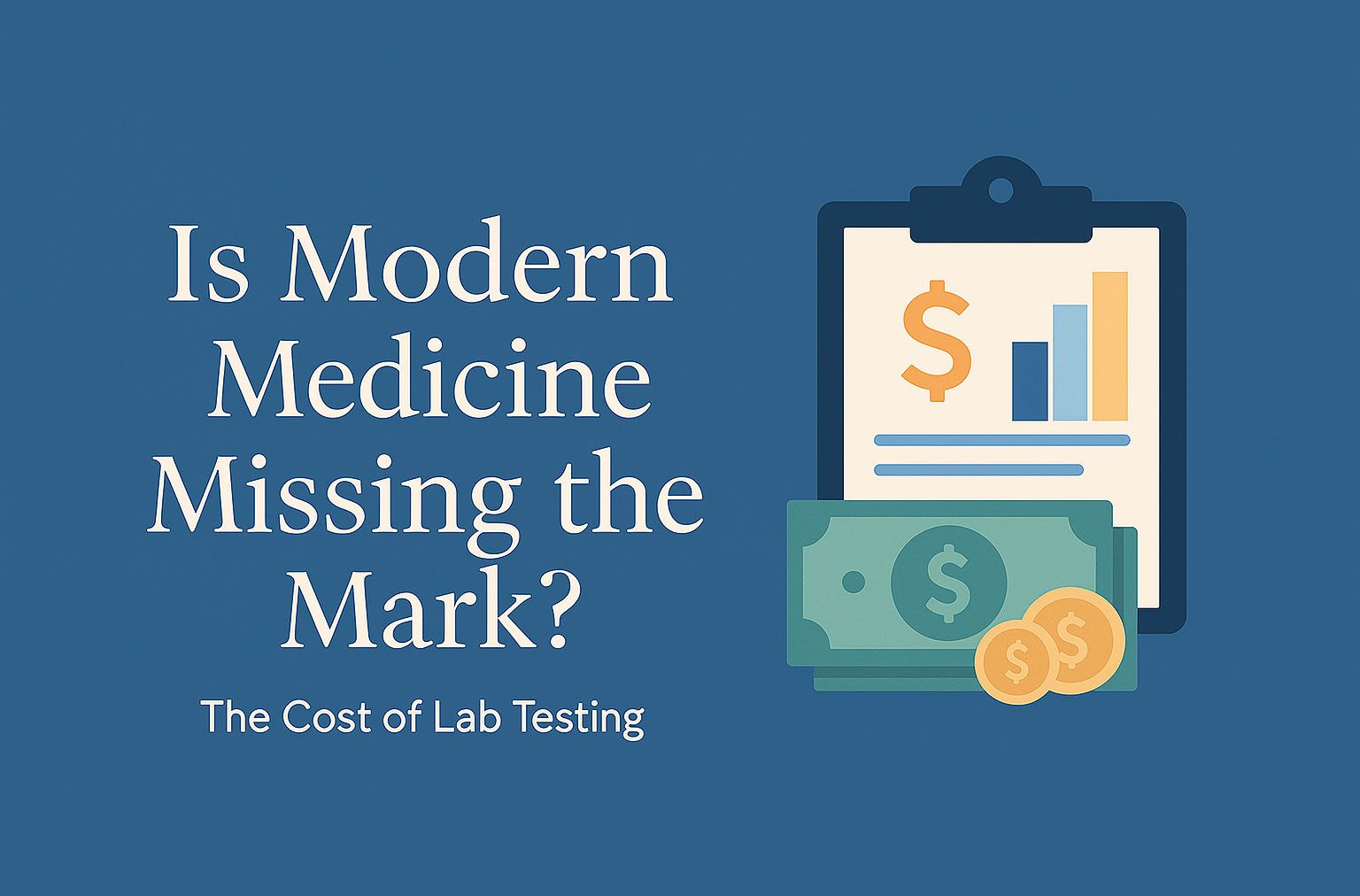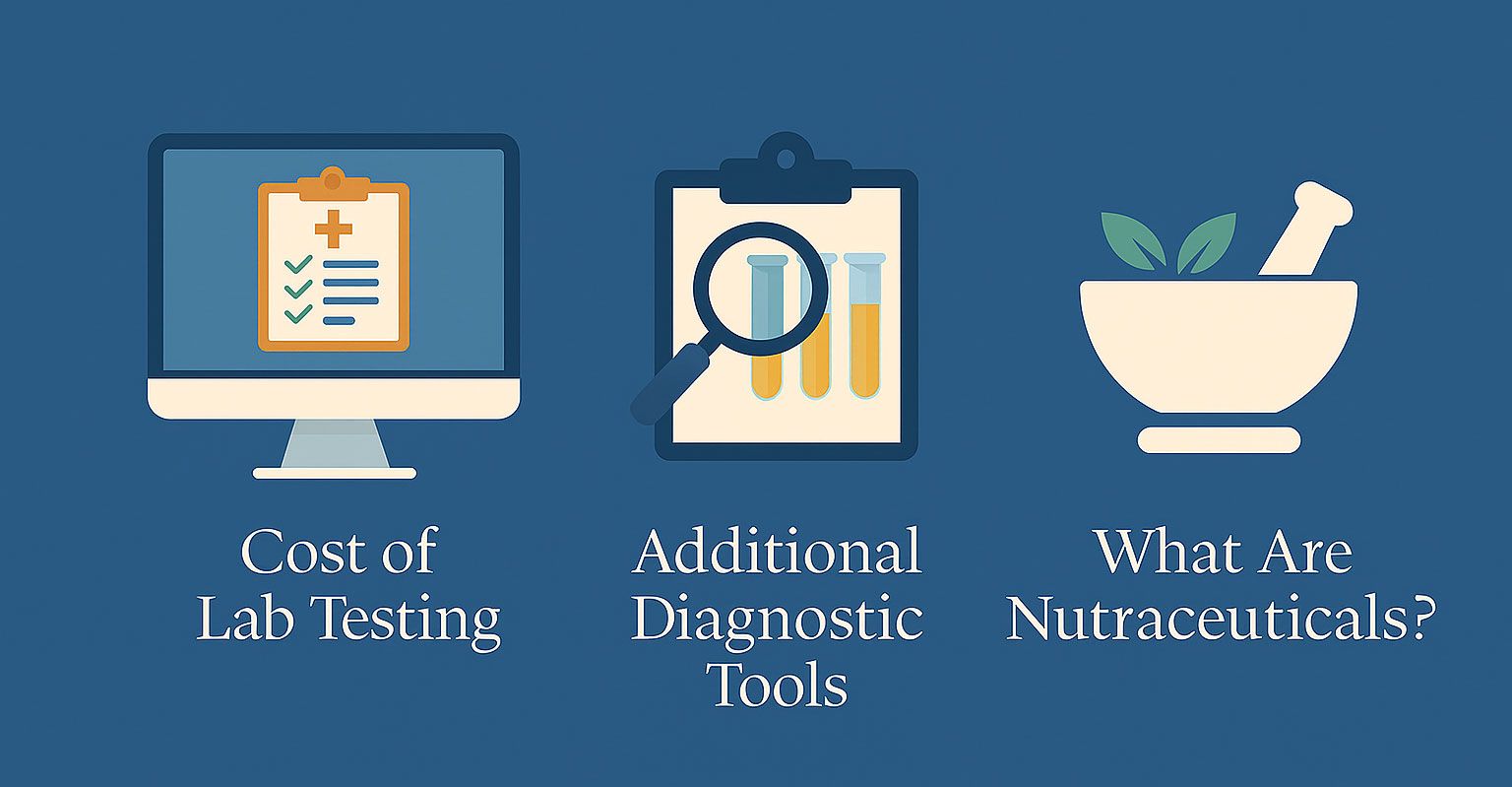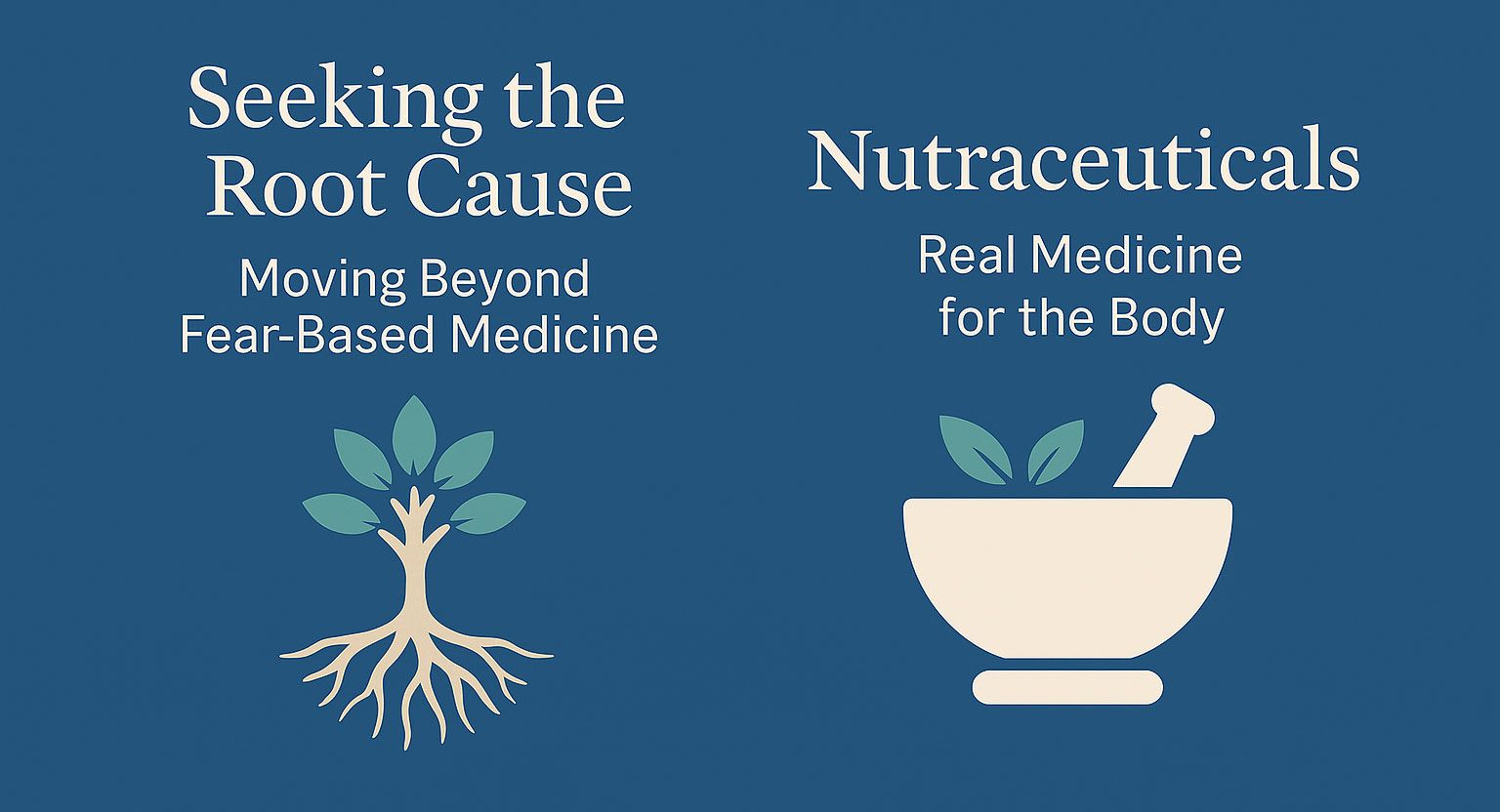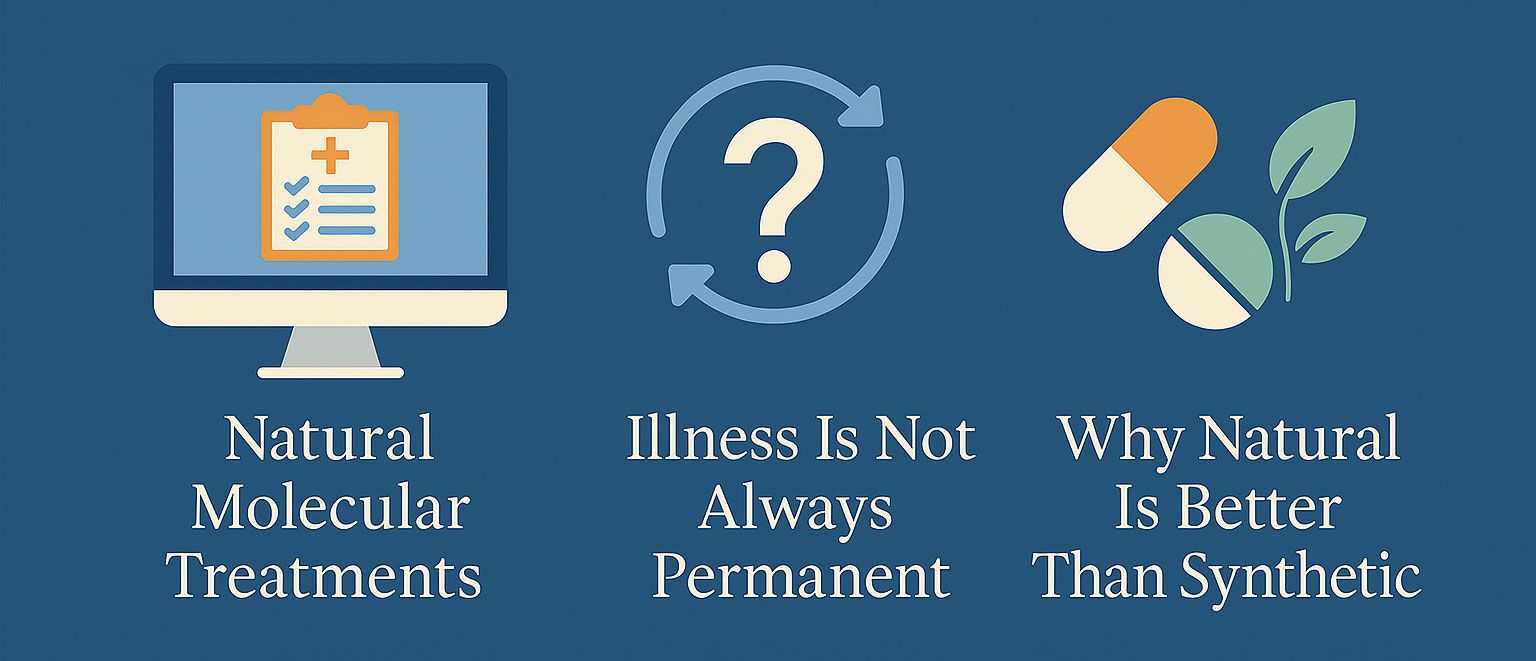
The Cost of Lab Testing



Today’s Topic:
The Cost of Lab Testing
Transcribed: June 2, 2025
Note: This post is a transcript from the TV show Nutritional Medicine by Lab Analysis. The episode is titled The Cost of Lab Testing and offers an in depth look at lab based nutritional assessment and its value in preventive healthcare.

-
Today’s Topic:
The Cost of Lab Testing -
The Rising Cost of Healthcare
The Value of Alternative Approaches -
Diet & Nutrition
Their Impact on Health Outcomes -
Is Modern Medicine Missing the Mark?
The Cost of Lab Testing -
A Comprehensive Nutritional Profile:
Getting to the Root of Symptoms -
The Cost of Lab Testing
Tailored Nutritional Recommendations -
Seeking the Root Cause:
Moving Beyond Fear Based Medicine -
Molecular Medicine:
Treating the Root, Not the Symptom -
The Code of Honor:
A Higher Standard of Care
Many people rely on health insurance to cover lab testing through their primary care providers. However, insurance companies often limit the number of items tested, typically around 25 or 26 biomarkers. In our experience, that’s not enough to get a complete picture of your health.
We prefer to test 52 key blood markers to gain a more comprehensive understanding of your health status. In addition, we conduct about 30 hair analysis tests to assess heavy metal toxicity and essential mineral levels.
In this episode, we’ll break down the costs of lab testing in California, based on pricing from the most commonly used laboratory service centers. Please note that these are general figures for comparison and do not reflect my personal rates.
The Rising Cost of Healthcare
The Value of Alternative Approaches
Let’s take a moment to examine the cost of lab testing and the rising cost of healthcare over time. In 1950, healthcare spending accounted for about 5% of the U.S. Gross Domestic Product (GDP). By 2010, that number had surged to 16%. Despite this dramatic increase, the World Health Organization ranks the United States 39th in overall health outcomes. We also continue to rank poorly in key areas such as infant mortality, access to care, and general mortality rates.
Clearly, spending more doesn’t necessarily mean better health.
One reason may be that our healthcare system heavily emphasizes pharmaceutical treatments, often at the expense of preventative or root-cause approaches.
Alternative Modalities in Healthcare
Alternative healthcare modalities, such as nutritional medicine, offer a different approach. Through tools like blood testing, saliva testing (for hormone levels and allergies), and hair analysis (for heavy metals and minerals), we gain a deeper, more holistic understanding of health.
Other effective alternative treatments include:
Unfortunately, these modalities are rarely covered by insurance. Most insurance-based care is tied to pharmaceutical treatments that primarily suppress symptoms rather than addressing the root cause of illness.
Ask yourself this: Do you want your symptoms managed, or do you want to uncover and treat the true cause of your health concerns?
Pharmaceuticals can be effective at relieving symptoms, but they rarely correct the underlying imbalance in the body. True healing requires restoring the proper molecules your body needs to support natural healing, something synthetic drugs do not provide.
A Practical Solution
You don’t have to choose one system over the other. One smart strategy is to use your insurance for diagnostic purposes, such as basic blood or urine tests. Keep in mind, though, that insurance based tests usually only cover about half of the markers we test in a full nutritional panel.
Once you have those results, you can choose to treat with natural, healthy substances instead of relying solely on pharmaceutical drugs. This gives you the benefit of advanced diagnostics with the healing power of natural medicine without being locked into a symptom management model.
Diet & Nutrition
Their Impact on Health Outcomes
Let’s take a closer look at the dietary habits of children in different countries, starting with Britain. Unfortunately, the average British child’s diet consists largely of processed, packaged, and canned foods. This is concerning for several reasons.
Most canned foods are lined with a varnish coating that contains bisphenol phosphates (BPA)—chemicals known to disrupt hormones and contribute to chronic health issues. These substances are present not only in cans at the grocery store but also in meals served at many restaurants, where canned ingredients are often used.
A child consuming a diet high in processed and canned foods starts life at a disadvantage. The odds of reaching 90 years of age in good health physically, mentally, and emotionally become significantly lower.
Now, let’s compare that to the average American diet. While there are typically more animal products such as meat, eggs, dairy, and cheese some of which are in a more natural state, there’s still a heavy reliance on processed and fast food. Even though the presence of vegetables and whole foods is somewhat greater, many Americans still fall into the trap of convenience-based eating.
The Link Between Diet and Behavior
Interestingly, the U.S. has one of the highest homicide rates in the world. While many attribute this to issues like gun control, studies suggest a strong correlation between diet and aggression, particularly related to the consumption of omega-6 fatty acids.
Diets high in processed seed oils, rich in omega-6s, are linked to increased aggression and behavioral instability. In contrast, omega-3 fatty acids, found in fish and some plant sources, are essential for brain health and emotional regulation. Additionally, saturated fats from high quality animal products like grass fed meat, dairy, and wild caught fish, play an important role in overall vitality and longevity.
A Data Driven Approach to Nutrition
At the forefront of nutritional health is a program developed by physicians who utilize blood, hair, and urine analysis to determine nutritional needs. With thousands of data points from patients, this system allows practitioners to identify specific nutrient imbalances and recommend targeted solutions.
For example, we begin with a comprehensive 52 marker blood test, alongside other diagnostic tools. After following a customized nutritional plan for five months, the patient showed significant improvement in their lab results and overall health.
Tracking Progress Over Time with Comprehensive Testing
One of the most powerful aspects of our approach is the ability to track changes in your health over time. If a patient undergoes a series of six or more blood tests over several months, or even a couple of years, we can align these tests in parallel. This gives us a clear picture of:
- • Where we need to adjust the treatment plan
- • What’s improving
- • What remains unchanged
By reviewing your progress this way, we can fine tune your nutritional program for better, more consistent outcomes.
Is Modern Medicine Missing the Mark?
The Cost of Lab Testing
Here’s a breakdown of the cost of lab testing in California, based on widely used labs (these are not our clinic’s prices):
- Cancer Markers: $35–$180 (depending on how many are tested)
- Complete Blood Count (CBC) with Differential: $100
- Female Hormone Panel (via saliva, monthly cycle graph): ~$200
- 52 Element Chem Profile: $250
- Vitamin D Test: $72
- Female Hormone Panel (via blood): $225
- Prostate-Specific Antigen (PSA) for Men: $32
These prices reflect the cost of lab testing for patients across the state and provide insight into the affordability of getting a more complete picture of your health.
What These Tests Reveal
When we run a 52 marker chem profile, we evaluate critical systems and biomarkers, including:
- Inflammation markers (often overlapping with cancer indicators)
- Pancreatic function and glucose metabolism (to assess obesity or diabetes risk)
- Electrolyte and mineral balance
- Thyroid function
- Liver and kidney health
The CBC with differential looks deeper into your blood’s cellular components, including:
- Red blood cell count and morphology (to detect anemia)
- White blood cell count and subtypes (to evaluate immune function)
- Sedimentation rate (an important inflammation marker)
These results help us understand the underlying causes of symptoms and guide nutritional and lifestyle recommendations tailored to your specific needs.
Identifying Inflammation Through Nutrition
Chronic inflammation is often driven by dietary imbalances, such as excessive intake of sugar, alcohol, grains, and legumes. These can lead to dysbiosis, an imbalance in gut bacteria that contributes to systemic inflammation.
Fortunately, we can measure this inflammation and take action. By identifying the degree and source of inflammation, we can prioritize specific interventions to help restore gut health and reduce disease risk.
A Comprehensive Nutritional Profile:
Getting to the Root of Symptoms
When we conduct a nutritional profile, we go far beyond the surface. We begin by documenting all the patient’s symptoms, both current and chronic. From there, we dive into:
- A complete list of medications
- Potential side effects of those medications
- Primary health findings
This is critical because many symptoms people experience may not be due to illness but rather to the side effects of prescribed drugs. Understanding the full picture allows us to properly interpret blood and hair test results in context.
We also perform a coronary risk assessment, evaluate for possible inflammation, diabetes, anemia, and other underlying concerns. All of this is included in our 52 element blood test, which forms the backbone of your personalized health roadmap.
Hair Analysis: Exposing Hidden Toxins
In addition to blood, we analyze hair samples to detect heavy metals and nutrient imbalances. In one example, a patient had elevated levels of:
- Arsenic
- Cadmium
- Mercury
These toxic heavy metals act like free radicals in the body attaching to cells where they don’t belong and interfering with critical functions.
Hair analysis also evaluates beneficial minerals, which help us understand nutritional deficiencies. When compared over time especially across multiple tests we can track improvement, much like we do with blood work.
The Cost of Lab Testing
We use software to generate personalized recommendations based on your lab results. However, as your physician, I retain the ability to override automated suggestions. Why? Because I know you—your history, your needs, your lifestyle. No algorithm can replace the insights gained from an ongoing doctor-patient relationship.
Additional Diagnostic Tools and Detox Strategies
Some other valuable diagnostic and detoxification tools and the cost of lab testing:
- Meta-Oxy Test (oxidative stress and detox ability via urine): ~$75
- Hair Analysis: ~$150
- Heavy Metal Urine Test (pre/post DMSA chelation): ~$225
To remove heavy metals, we use DMSA, a safe chelation agent. The process includes:
- Taking the supplement for 3 days
- Resting for 11 days
- Repeating for 5 cycles
- Retesting to measure results
This method allows us to gently and effectively reduce toxic burden from the body.
What Are Nutraceuticals?
There’s a common misconception that supplements are just “vitamins” from a health food store that may or may not work. That belief couldn’t be further from the truth.
Nutraceuticals are concentrated extracts of food, formulated to have a measurable medicinal effect on the human body. They come in capsules, tablets, or powders and are administered at therapeutic doses.
More precisely, a nutraceutical is any food-derived compound that:
- Demonstrates a clear physiological benefit, or
- Provides protection against chronic disease
A Vision for Long Term Wellness
There’s no reason we can’t feel vibrant, youthful, and inspired well into our 90s. When we take care of ourselves physically, emotionally, and nutritionally we can:
- Enjoy fulfilling relationships
- Travel, learn, and explore
- Maintain a sense of humor and purpose
- Stay creative and engaged
Today, we know what it takes to stay healthy and happy for the long haul. Let’s make that vision a reality.
Seeking the Root Cause:
Moving Beyond Fear Based Medicine
In today’s world, we know more about nutrition than ever before. There are very few mysteries left. With this wealth of knowledge, you can take control of your health if you’re willing to move away from fear based medicine.
Conventional medicine often reacts to symptoms with a mindset of: “Make it go away.” But true healing asks a deeper question:
“Why is this symptom happening in the first place?”
Instead of masking the issue, we seek the root cause and aim to resolve it through science-based, nutritionally guided care.
Nutraceuticals: Real Medicine for the Body
The past 30 years have seen an explosion of knowledge in the field of nutritional science. Nutraceuticals are not second rate or “alternative” they are real medicine.
Here’s why:
In your body, molecules are constantly being transformed. To turn molecule A into molecule B, your body needs an enzyme, a catalyst for that conversion. Enzymes perform critical functions like:
- Breaking apart molecules
- Reshaping atoms
- Activating or deactivating biological processes
And what acts as enzymes in the human body?
- Vitamins
- Minerals
- Amino acids
If you’re not getting enough of these, your body’s biochemistry suffers. Covering symptoms with pharmaceuticals does nothing to restore these vital processes.
Molecular Medicine:
Treating the Root, Not the Symptom
At the heart of my practice is a simple principle: treat the body with the molecules it naturally needs to function. These are not foreign or synthetic substances – they’re the vitamins, minerals, amino acids, enzymes, and herbs that your body is biologically designed to use.
If our food supply were perfect, we wouldn’t need supplementation. But modern diets fall short, so naturally occurring molecular treatments help fill the gap. These aren’t “extra” substances – they’re exactly what your body would require under ideal conditions. When you supply these molecules, the body can often return to its healthy, pre-illness state.
Illness Is Not Always Permanent
Too many people believe that once they’re given a diagnosis, it becomes a life sentence.
But just ask yourself:
“Did I have this illness six months ago? What changed?”
Something disrupted the normal functioning of your body. Instead of resigning yourself to chronic disease, we ask:
- What molecules stopped functioning correctly?
- What can we restore?
- What went missing?
When you find the root cause and correct it, the illness can often resolve. That’s the power of molecular medicine.
Why Natural Is Better Than Synthetic
Pharmaceutical drugs are man made molecules. They are rarely found in food and almost never in the human body. These drugs are engineered to suppress symptoms and often they do that well – but at what cost?
On average, pharmaceutical medications come with 30 side effects. In contrast, natural molecules tend to have no side effects and dozens of beneficial effects. They support the body holistically, not just one isolated function.
Here’s the difference in plain terms:
| Type | Effect | Side Effects |
|---|---|---|
Pharmaceutical (man-made) | Targets one symptom | ~30 side effects |
Natural molecule (e.g., vitamin, herb) | Supports multiple systems | ~30 beneficial effects |
The Code of Honor:
A Higher Standard of Care
I deeply admire Dr. Van Merkle, the founder of Science Based Nutrition™, whose “Code of Honor” guides my practice:
“It is an awesome responsibility when a person comes to me. I must do my best. I must not be distracted. I will not order one test or recommend one vitamin more than is necessary. But neither shall I shirk from my duty. Without health, how can one fulfill their optimum potential or purpose in life?”
What does this mean in practice?
It means I will be honest and clear with you. If your health requires a specific course of action – X, Y, or Z – I will strongly recommend it. I won’t dilute the message or tell you only what you want to hear. Why? Because your health matters, and we now know what works.
I encourage you to do your own research. Check reputable sources. You’ll find that the science supports this integrative, root cause approach.
Final Notes:
The Cost of Lab Testing
This particular message was about the cost of lab testing, which many people overestimate. Contrary to common belief, it’s not a $3,000 or $4,000 ordeal. In most cases, comprehensive testing falls within the low hundreds of dollars – a small investment for life changing insight into your health.
Note / Edit: This post ‘The Cost of Lab Testing’ is a transcript from an older video. The video was originally recorded in 2013. Since then, advancements in testing technology and clinical insights have significantly improved how we assess health. Today, we use more advanced blood panels and diagnostic tools to provide even greater accuracy and clarity in your personalized wellness plan.
We now test 61 essential blood markers, offering an even more comprehensive picture of your internal health than ever before. This expanded panel allows us to assess nutritional status, metabolic function, inflammation, organ health, and chronic disease risk with exceptional detail and accuracy.
In addition to advanced blood analysis, we utilize cutting edge urine testing, which provides insight into your body’s detoxification capacity, oxidative stress levels, and metabolic activity.
While hair analysis was previously part of our standard protocol, it is no longer a regular part of our services. However, in rare cases such as long term heavy metal exposure or unique toxicology assessments a hair test may still be recommended when appropriate.
This updated diagnostic approach ensures that your health plan is based on the most current, science backed data available.
-
Today’s Topic:
The Cost of Lab Testing -
The Rising Cost of Healthcare
The Value of Alternative Approaches -
Diet & Nutrition
Their Impact on Health Outcomes -
Is Modern Medicine Missing the Mark?
The Cost of Lab Testing -
A Comprehensive Nutritional Profile:
Getting to the Root of Symptoms -
The Cost of Lab Testing
Tailored Nutritional Recommendations -
Seeking the Root Cause:
Moving Beyond Fear Based Medicine -
Molecular Medicine:
Treating the Root, Not the Symptom -
The Code of Honor:
A Higher Standard of Care
Dr. Cyrus Thomas
With over 47 years in integrative health, Dr. Cyrus Thomas combines advanced diagnostic lab testing with the power of functional nutrition to uncover and address the root causes of illness. He holds a Doctor of Chiropractic degree from Cleveland Chiropractic College and has dedicated his career to personalized, whole-person care. As the voice behind Functional Health Insights, Dr. Thomas shares his clinical expertise and decades of experience to help others heal from within through the use of molecular medicine.


Insights That Transform.
Take the First Step Toward Real Answers.
Get personalized care that makes a difference.


Insights That Transform.
Take the First Step
Toward Real Answers.
Get personalized care that makes a difference.

